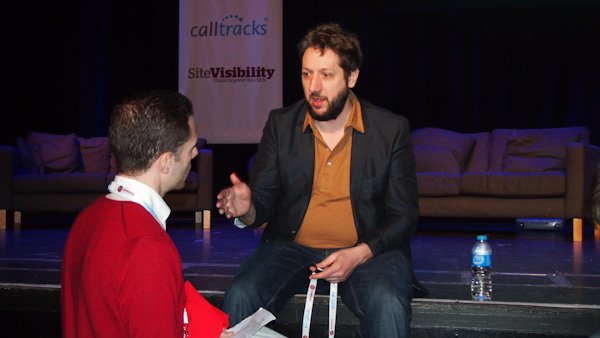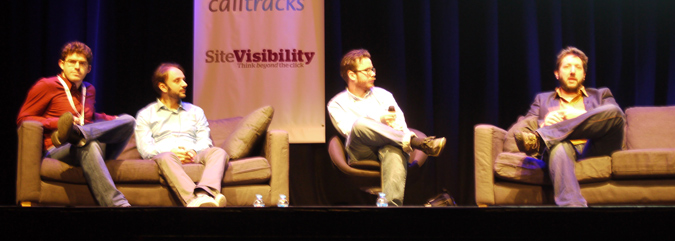Aaron Charlie
12 Apr 2013
Ask the Ex-Googlers Anything Panel: BrightonSEO 2013
In this first session of the brilliant Brighton SEO, we were lucky enough to get the opportunity to hear some ex-Google employees answer questions posed by the audience.
The three ex-employees all come from the Search Quality team of Google: Fili Wiese, Jonas Weber and Alfredo Pulvirenti.
Hearing details about Google's processes straight from the horse's mouth is like gold-dust to SEOs but for an up-to-date understanding of the direction that the industry is headed, you can't beat our Mobile SEO Course!
Google Team Structure
First up they were asked about the structure of the teams at Google.
The teams are split into algorithmic and manual search engineers. The algorithmic side take a big-picture approach while the manual side (in which our ex-Googlers were working) take a more detailed and case-specific approach.
The manual team is also focused on more geo-specific aspects such as how relevant a search result will be for a specific area etc.
Penalties
The session quickly turned to penalties and the speakers were asked a series of questions on this theme.
In terms of the structure of penalty responses, generally it's the more senior members of the team who are privy to 'big' issues like manual penalties.
However, there are multiple stages to the penalty process: it goes through various team members who must justify and accept the reason for submitting a penalty, before a final decision is made.
Spam
Not surprisingly, from penalties the talk then moved onto spam.
Porn was the main issue in terms of spam when Jonas Weber first started at Google but it gradually moved more towards issues like buying links and other spam 'grey' areas. In terms of buying links, it's lack of relevancy and quality that are the biggest warning signals to Google, so if you are going to buy links (which we sincerely don't recommend) then at least make them appropriate to your site!
'Normal' looking sites are always going to be the best approach although then again, what's normal? Bad links need to be taken within the context of the industry e.g. if all your competitors have the same bad links as you then you're not going to fall out the SERPS; at least not for long."Sometimes Google just doesn't have the data" to make an accurate judgement on a site or set of sites.
Overall, SEO should be a long-term strategy but if it's short-term you want - our ex-Googlers say that hacking higher ranking pages is the quickest, most effective way to rank (although this is of course highly illegal and not recommended!).
If it's a client asking you for this, try to go into 'teaching' mode - explain to them why it's not a good idea and ask why they want specifically quick results.

Disavow Tool and Removal Requests
Moving on to removing links, the panel were asked "How does Google deal with disavow requests and what's the difference between that action and manual link penalties?" At the moment, nothing is being done with the disavow data and it's unlikely to happen soon.
Similar to the removal request - it's mainly a way to gather more data but doesn't have a negative affect. Very big sites find it hard to get rid of all bad links and so the disavow tool provides an easier and more effective way but it must be combined with re-inclusion requests.
The main point though is that if you don't trust a site, disavow the whole domain rather than just a link.
One question a lot of SEOs would be interested in hearing an answer to is whether Google responds to all spam reports.
The answer is a definite yes - most are looked at within a week, although it depends on the market and language. English (or mass-spoken languages) will have a quicker response.
Fili's advice? Be short and efficient with your reports.
Similarly the panel were asked whether Google spends any time on false link removal i.e. when a webmaster appears to have actively responded to a link removal request, only for that link to appear again.
The answer is that Google aren't yet actively investigating this but remember, "Don't play games with the reconsideration team!" Feel free to disavow and send reconsideration requests at the same time. The disavow tool is Google's attempt to build a scalable solution to these issues.
Google wants you to try to get rid of the bad link and if that's via the disavow tool then so be it.
No-follow Links
The ex-Googlers were asked "What circumstances should no-follow links be used in?"
Their response? Use them when you don't want to give power to the linker. However, if you're solving a problem with quality content, follow or no follow links aren't an issue.
Link Building
All of the ex-Googlers now work in SEO and as such they were, unsurprisingly, asked about their link building strategies.
For Jonas Weber, SEOs sometimes think too dirty - that's why he got writers and journalists on-board instead.His top tip though: if you're an in-house SEO, build up a relationship with relevant sites with whom you can exchange links; just make sure they are consistent.
What kind of content should you create for search engines? It's all about solving a problem, description is not enough, it needs to be an explanation.
In the end though, the only kind of content you should create is that which is relevant and useful to your potential clients - cater for people before machines.
Social Signals
Despite much hype, according to panel, social signals are not really used at the moment -but it's highly likely that at least Google + activity will feature in the future. The question we should be asking is "do we need to consider social as a search factor?"
If we must, it's important to remember that Facebook is walled off but Google will know a lot about you from G+. G+ will give them long-term data for when they do start using it.
Most of all though, and perhaps one of the biggest points of the session was that Google definitely uses Chrome user data and can track every click within it.
Best and Worst Things About Working at Google
Best things: Weekly massage(!), the constant innovation and the ability and need to reinvent and rewrite whole objectives in weeks or even days.
Worst things: The levels of bureaucracy are growing as the company grows. The culture has changed which makes it somewhat unsurprising that the leaving rate is very high.

Final Thoughts
In all, this was a particularly useful and revealing session. Some key take away points then:
- Be smart and efficient with your spam reports
- Solve users' problems with relevant content
- Don't think of Social in terms of search, it's an entity in and of itself
- Remember that Google tracks everything you do in Chrome
- If you want to be #1 in Google quickly and for a short-time, hack bigger sites (although if you enjoy not being in prison then this isn't the best idea!)
Hopefully that gives you some intriguing or enlightening information about how search works, but if you want to fully understand the field, our SEO Workshops are a great way to get fully up to speed with the industry .